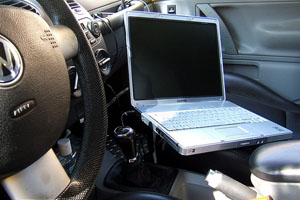 This past week, tech blogs have asked an important question for the future of distracted driving: why haven’t we mastered the technology to make cell phone use behind the wheel safe? While a number of car companies, cell phone service operators, and independent techies have probed Bluetooth, voice recognition, and text prediction as potential solutions, no safe driving technology is currently widely used and the number of distracted drivers continues to increase. To make matters worse, new research shows that these tech advances could have a minimal impact, at best, on driver safety.
This past week, tech blogs have asked an important question for the future of distracted driving: why haven’t we mastered the technology to make cell phone use behind the wheel safe? While a number of car companies, cell phone service operators, and independent techies have probed Bluetooth, voice recognition, and text prediction as potential solutions, no safe driving technology is currently widely used and the number of distracted drivers continues to increase. To make matters worse, new research shows that these tech advances could have a minimal impact, at best, on driver safety.
Over on Wired’s Epicenter blog, Joel Johnson points out that while software has been created for iPhone and Android, all options have drawbacks that prevent widespread use. This logic leads Mike Masnick of TechDirt to predict that due to the apparent inability to create a catchall cell phone safety program, “we’re going to wait until we really get autonomous driving vehicles that have an ‘autopilot’ mode before we reach a stage where any sort of texting while driving is safe.”
Mastering voice control for cell phones appears to be the ideal choice. But I’ve never seen such software work even remotely well. And if the moderate success of T9 text prediction software is any indication, it will be a while before complete voice control gets the words right.
More importantly, when it comes to safety, advanced technology for safe driving while zooming down the highway is ineffective. Recent studies have shown that hands free conversations are barely safer than holding the phone to your face. According to the Department of Transportation, there were 4,500 accidents among people using hands-free devices between 2006 and 2008, not much lower than the 5,500 crashes among people using hand-held devices over the same period. And this doesn’t even take into account the false sense of safety such technologies could give drivers.
“Even though you are listening, your mind is processing the information, and you’re busy formulating a response,” said AAA Mid-Atlantic spokeswoman Tracy Noble. “We have to change the culture that everyone is multitasking when they are in a vehicle because it is a danger when you are taking your attention off the roadway.”
So while any technology to get our eyes on the road will benefit driver safety, the research so far indicates that we must promote a major change in behavior against having conversations behind the wheel altogether in order to achieve substantive safety. Until then, though, let’s just put down the phones and focus on the road.
Photo credit: ASurroca

